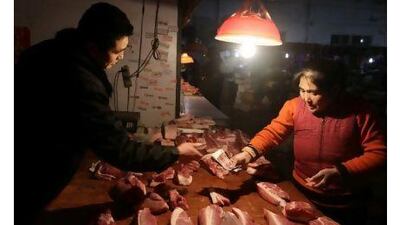BEIJING // When Song Yidan, a master's student in Chinese culture from Beijing, decided to become a vegetarian last November, her friends and family did everything they could to dissuade her.
Her mother tempted her with tasty meat dishes, and her friends told her the diet would be bad for her health.
Even people Ms Song barely knew weighed in with cautionary tales of devout Buddhists - traditionally the only vegetarian group in China - who had fallen sick because of their eating habits.
"They were very serious. They said being vegetarian was unscientific," she said. "My parents were worried I would become a nun."
A belief that consuming meat means eating well runs deep in China, which struggled to feed itself throughout much of its history and where many followed a largely vegetarian diet because they could not afford meat.
As China has grown richer during the past four decades, meat consumption has almost quintupled, and no business dinner or wedding banquet is complete without a spread of myriad meats.
But Ms Song is part of a small but growing number of often affluent Chinese who are eschewing meat for religious, environmental or health reasons. A spate of food scandals is blamed for many of the conversions.
While figures are hard to come by - strict rules on forming organisations outside the control of the ruling communist party means there is no national vegetarian or vegan society - international groups are reporting a huge spike in interest from China.
People for the Ethical Treatment of Animals says its web site now receives more traffic from China than anywhere else, and small local groups say they have never seen interest in vegetarianism so high.
Peta's senior campaigner in the Asia Pacific region, Ashley Fruno, said: "As more people are realising that a plant-based diet is the best thing they can do for their own health, the environment, and of course the animals, vegetarianism is a rising trend in China."
The most obvious evidence of the trend has been the explosion of vegan and vegetarian restaurants in big cities such as Beijing.
A decade ago you could count the vegetarian restaurants in China's capital on two hands. Today there are more than 100.
The restaurants themselves have changed, too. In the past, most were attached to Buddhist temples, or run by former nuns or monks, making eating in them a quasi-religious experience that did not always appeal in largely atheist China.
They also focused on creating dishes that simulated the flavour and texture of meat - such as vegetarian Peking duck - which some purists found off-putting.
Many of the new restaurants, however, are airy, modern affairs where food is unashamedly vegetarian or vegan, and often organic.
"Tofu and mushrooms have their own unique flavours. We don't try to cook them as meat. We allow those favours to speak for themselves," says Wang Rui, the proprietor of Good Mother's Vegan Restaurant, which opened in central Beijing in January.
Ms Wang says that just a few years ago most vegetarians came to the practice through conversion to, or reacquaintance with, the Buddhist faith, which was suppressed in China until the death of Mao Zedong, in 1976.
But increasingly that connection with religion has been eroded - as well as the idea that vegetarianism is a concept imported from the West, such as owning pets. Today her friends and customers are increasingly giving up meat for other reasons, such as food safety.
China has been rocked by a string of food-tampering scandals in recent years. This spring alone the Chinese media have featured stories of pork sold as beef after being soaked in borax, a cleaning agent; restaurants using cooking oil reclaimed from sewers, and watermelons sprayed with so much growth agent that they exploded.
Three years since the government vowed to tighten food-safety regulations after more than 300,000 babies fell sick and six died after drinking formula laced with the protein simulator melamine, the chemical is still found in milk power with alarming regularity.
Dai Yuhan, a 31-year-old mother and teacher whose family gave up meat two months ago, said: "It wasn't easy switching to a vegetarian diet, but we felt it would be safer."
Of course, being vegetarian does not protect you from growth agents in watermelons or fake grapes, so many of the new-wave vegetarians go organic as well.
Mrs Dai sends her child to a private school that serves only organic vegetarian food; she also has organic vegetables delivered to her home every week, even though they are much more expensive.
"It's not cheap, but you can't put a price on your health," says Mrs Dai.
While vegetarian activists say you don't need to go organic to enjoy many of the benefits of being vegetarian, the cost of eating this way may actually be helping to popularise it in some circles.
"Before, people might not have thought it very hospitable if you invited them to a vegetarian restaurant," says Ms Wang, whose restaurant is in the process of going fully organic.
"Now we get lots of businessmen bringing their clients here."

